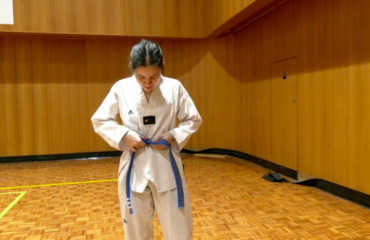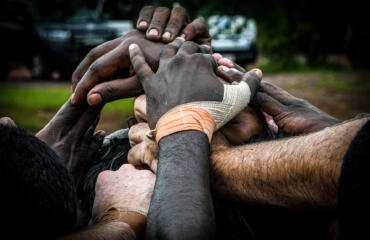Around the country, Australia held its collective breath. After 120 minutes of frantic football in the 2022 FIFA World Cup qualifying play-off between the Socceroos and Peru, it was down to penalties to determine which nation would earn a spot in Qatar.
A mixed bag of penalties from each side had Sydney FC stopper Andrew Redmayne facing Peruvian Alex Valera for the decisive kick. As Redmayne dived low to his right and punched the ball away from his goal with authority, fans back home erupted in celebration. Australia was through to another World Cup.
Chris Beath, however, had already booked his ticket to represent Australia in Qatar. The 37-year-old Queenslander will be centre stage as a match referee, the only Aussie among 36 selected and just the sixth Australian even to blow the whistle at a World Cup.
“In terms of the football space, it’s absolutely the top. There’s no bigger honour in our space, to be selected to go to a World Cup is the pinnacle,” Beath says.
You may not have heard of Beath, one of only four full-time referees in Australia; like most of the top officials worldwide, little is known about him.
It’s time for that to change.
Beath is in Qatar with regular Aussie partners in crime Ashley Beecham and Anton Shchetinin, who will serve as assistant referees, as well as Shaun Evans as a Video Match Official (VMO).
Most people in elite sports will be familiar with the heartstopping ‘phone call’, the conversation that confirms selection for a team or event.
For Beath, however, an email ping from FIFA sealed his spot on the referee roster for Qatar and the emotional impact was palpable.
“We thought we were certainly a chance, we knew we were in the frame for selection, but we didn’t want to take anything for granted until we saw something official,” he reflects.
He joins an exclusive group in Qatar this November, becoming just the sixth Australian to referee at a World Cup after Tony Boskovic (1974, 1982), Chris Bambridge (1986), Eddie Lennie (1998), Mark Shield (2002, 2006) and Ben Williams (2014).
While it can appear a lonely profession, refereeing is inherently team-oriented. Assistant referees play a huge role on matchday, adjudicating when the ball leaves the field of play and offside offences, as well as advising the referee of any foul that they haven’t spotted.

World Cup 2022 venue, Education City Stadium, Doha. Image: Korea.net / Korean Culture and Information Service (Heo Manjin), CC BY-SA 2.0 <https://creativecommons.org/licenses/by-sa/2.0>, via Wikimedia Commons
Referees travel the world with their tight-knit group of assistants and trust them as an extra set of eyes on the field. It’s no different for Beath and his team, who have established a bond over several years.
“Those boys work equally as hard to get there and I’m thrilled that we’re going to be there together,” he says.
All up, 129 officials from across the globe have gathered to put on the 2022 World Cup. Beath is therefore grateful that he has three Aussies by his side.
In taking control of matches at this year’s festival of football, Australia’s officials will be exposed to the very best players on the world stage – Cristiano Ronaldo, Kylian Mbappe and Lionel Messi are just a few of the stars who our refs might cross paths with on the pitch in Qatar.
Rubbing shoulders with round ball royalty was just a dream for Beath when he first swapped playing colours for referee attire as a curious schoolboy.
“I fell in love with it… it’s the best seat in the house,” recalls Beath, tracing his refereeing roots.
Starting from the bottom, appointments in youth competitions morphed into a spot on the A-League Men’s list, before a FIFA listing opened up international opportunities in 2011.
A decade at the highest level speaks volumes for Beath’s experience and professionalism – he has refereed matches between powerhouse clubs and nations during that time, officiating in the last three A-League Grand Finals.
The life of the ambitious ref is one of baggage carousels and time away from home; frequent travel is a necessary commitment in order to be considered for the best appointments. “I’ve got an incredibly supportive family, particularly my wife who has been supportive from day one. I certainly couldn’t do what I do without her,” says Beath, a father of two.
Given the partisan, emotionally charged nature of sport, its commonplace for officials to cop a ton of criticism. The verbal blowtorch has been levelled the way of the assertive Beath over the years – from fans, players, coaches, and commentators alike.
In 2015, tensions between A-League team Sydney FC and Beath came to a head when the club lobbied the Football Federation Australia (FFA) to remove him from matches following a series of controversial calls that went against them.
“There’s a lot of pressure that comes with the job and probably quite a few of those [moments to forget],” explains Beath.
“But I think, as with any career in any industry, it’s what you do after the fact, how you learn from it to become a better person and a better referee.”
Beath has also had to defend his decision on live TV – post-match, when emotions are high – and has had to shield himself from bullying, in the form of online petitions started by outraged fans to have him sacked from the referee roster. With pressure comes nerves, and not even someone as qualified as Beath is immune to pre-game anxiety.
“Keeping my attention on the next decision pushes pressure aside a little bit because I’m not too worried about the overall scale of the events,” he explains.
“I think with a bit of experience I’ve got that part of the game nailed, but in saying that I still get nervous before each game. I think that’s all natural.”
Mental strength will be invaluable when the World Cup arrives, as referees aim to perform at their peak in front of a global audience – more than one billion people tuned in to coverage of the 2018 World Cup Final between France and Croatia.
Ben Williams remembers his World Cup experience all too well as the first Australian referee to be selected for a knockout stage match in 2014: the nerves, the excitement, and the weight of expectation.
“I’ll never forget standing in that tunnel and hearing the FIFA anthem play. It gives me goosebumps just talking about it, even eight years down the track,” he says.
“You’re not just representing FIFA, you’re representing Australia and you’re representing your mates and family.”
Beath’s broad and surprising range of interests outside football no doubt contributes to his strength and resolve.
Before becoming a full-time referee, he co-founded A Class Business Finance, providing business asset finance, vehicle finance, property finance, and cash flow finance., and he’s still the company’s managing director.
As if his forays into finance weren’t enough, Beath recently completed a Diploma of Paramedical Science and is currently studying a Bachelor of Paramedical Science at QUT, studying remotely and often mid-flight.
Until the first whistle blew in Qatar, Beath was doing one or even two sessions each day to be in top physical and mental shape. Alongside a physical routine involving running and gym visits, technical analysis is a key tool used to sharpen the mind.
The process involves watching past matches with an analyst, taking notes on the key players and tactics of each team. This type of training allows referees to be efficient with their physical efforts, putting them in better positions to make the right decisions.
Beath spends plenty of with physiotherapists and massage therapists, and deep water running helps tone legs that will have to cover more than 10km in a single match.
“My mantra every single day is ‘what can I do today to prepare for the World Cup?’”, says Beath.“I’m making sure that I’m living and breathing football,” he says.
“The approach that my team and I have is consistent whether we’re doing a game locally here in Brisbane or whether we’re on the international stage.”
Fortunately for the Australian referee contingent, Qatar is a familiar office. Two Qatari teams feature alongside A-League clubs in the AFC Champions League, so Beath has spent plenty of time in the Arab nation.
“Qatar almost feels like a bit of a second home for me,” Beath says.
For Beath and his team, just making it to the World Cup is not enough. Like the players they share the pitch with, the performance of referees dictates how long they stay at a tournament and how many matches they are allocated.
Referees are assessed on their application of the laws of soccer,their fitness and positioning to make decisions; scoring well in these areas gives a referee a chance to officiate games in the knockout stages of a World Cup.
“As with any campaign, we want to try and stay there for as long as we can and do a great job on the games we are given,” says Beath.
Williams and his crew made it to the round of 16 in 2014, a record for Australian officials.
He wants Beath and co to go further, perhaps even all the way to the final to become the first Australian to officiate at the biggest game of them all.
“Chris is a calm and caring person, as well as a great leader. He’s meticulously planned, fit as hell, emotionally aware, politically aware, very intelligent and he’s got a great team with him as well,” says Williams.
“Chris, Anton and Ash, they all trust each other. We’ve got four blokes who will go over there and do the job, they will do whatever is best for the game.”
This story was first published by SBS. You can read it here.



